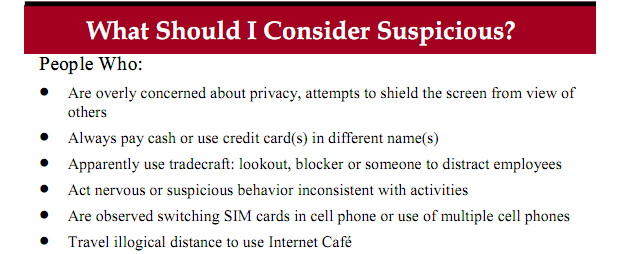Why the FBI thinks you (and I) may be terrorists

From the general atmosphere on ZDNet, it is quite evident that the vast majority of those who read our columns are "concerned about privacy". If you fall within this subjective category, the FBI may be onto you.
A leaked information sheet released to community businesses by the FBI explains the behaviours for which others should be on the lookout for, all in the name of combating and preventing terrorism.

While we may not all "attempt to shield the screen from view of others", many would agree that we would prefer others in our near vicinity to not look at the details of a private message sent over Twitter, or glance over at the photos of last week's epic house party on Facebook.
Interestingly, terrorists might use "residential based Internet service providers" like Comcast or AOL, and might also use, "anonymizers, portals, or other means to shield IP address" [sic] it adds.
God forbid you should want to bleach your hair. Purchasing "hydrogen peroxide" is also on the list of suspicious behaviours.
The interesting thing was --- for a then criminology student --- I had access to a wide range of radical and extremist "literature", and my fellow student colleagues all had a certain "preoccupation with press coverage" of terrorist attacks. It was what we did. The FBI is all but classifying every criminologist or terrorism-studies student into this camp, and more.
The fact of the matter is that intelligence agencies around the world don't actually know who is a terrorist and who isn't. A leaked document by the UK's security service MI5 highlighted in 2008 that: "Individuals who became involved in violent extremism in the UK have varied characteristics and backgrounds and are, on the whole, demographically unremarkable".
While the sheet is useful and provides a base level of what others should look for in others, it does highlight the need to continue to be vigilant. It does also note that: "The activities outlined on this handout are by no means all-inclusive but have been compiled from a review of terrorist events over several years."
Having said that, it may as well have added that anyone possessing "two eyes" might be a threat. Because as a criminologist, I can tell you that statistically two-eyed people are more likely to commit acts of terror than those who are visually impaired.
Image source: Public Intelligence/FBI.
Related:
- Can a cyber-attack really be considered an 'act of war'?
- BlackBerry encryption 'too secure': National security vs. consumer privacy
- Why Wikileaks cannot be a 'terrorist organisation'
- UK universities 'complacent' in preventing extremism
- Controversial counter-terror policy in UK education networks
- Homeland Security to issue terror alerts via Facebook, Twitter
- Summary: ZDNet's USA PATRIOT Act series